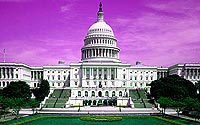Internet Developers Oppose House Anti-Piracy Bill
- by Wendy Davis @wendyndavis, December 15, 2011

More than 80 Web gurus warned Congress on Thursday that anti-piracy bills currently pending in the House and Senate could harm free speech and also undermine innovation by Internet engineers.
The Stop Online Piracy Act (HR 3261) and companion Senate bill, the Protect IP Act (S. 968), would “create an environment of tremendous fear and uncertainty for technological innovation, and seriously harm the credibility of the United States in its role as a steward of key Internet infrastructure,” states a letter to Congress signed by Vint Cerf, known as the “father of the Internet,” Esther Dyson, and other Internet engineers and inventors.
They warn Congress that “an incredible range of useful, law-abiding sites” could be blacklisted should the measures become law. “All censorship schemes impact speech beyond the category they were intended to restrict, but these bills are particularly egregious in that regard because they cause entire domains to vanish from the Web, not just infringing pages or files,” the letter states.
The letter was published the same day that the House Judiciary Committee began marking up the controversial legislation, which was introduced in October by Reps. Lamar Smith (R-Texas), John Conyers (D-Mich.), Bob Goodlatte (R-Va.) and Howard Berman (D-Calif.).
The bill provides for court orders banning ad networks and payment processors from doing business with “rogue” sites -- defined as sites dedicated to infringement. The measure also provides for court orders banning search engines from returning certain results and orders prohibiting Internet service providers from putting traffic through to certain URLs. (Even if ISPs did so, users could still reach their destinations by typing in the numeric IP addresses.)
Hollywood backs the bipartisan bill, arguing that it is needed to stop companies that are outside the jurisdiction of the U.S., and therefore need not comply with the Digital Millennium Copyright Act's takedown provisions. But opponents -- including law professors, digital rights groups, Web companies and Internet engineers -- say the bill is problematic.
They argue that it would result in censorship of legitimate material as well as “rogue” sites. Critics also say the law could discourage companies from hosting user-generated content. That's because the bill seems to curb provisions of the DMCA that protect companies from liability when users' posts infringe on copyright.
Currently, the DMCA's safe harbors provide that Web companies are immune from liability for infringing clips posted by users, provided the material is removed at the owner's request. But the bill could require sites to more actively police user-generated content for infringement or run the risk of being labeled rogue. Cerf and the other Internet mavens who signed a letter to Congress argued that it was a mistake to tinker with the domain name system.
“The US government has regularly claimed that it supports a free and open Internet, both domestically and abroad. We cannot have a free and open Internet unless its naming and routing systems sit above the political concerns and objectives of any one government or industry,” the letter states.
Another group of Internet engineers previously said that forcing ISPs to filter out certain domain names would be “minimally effective” and could “frustrate important security initiatives." On Thursday, several lawmakers urged their colleagues to hear from additional Web experts before voting on the measure. Rep. Dan Lungren (R-Calif.), chairman of the House cybersecurity panel, called the bill “somewhere between catastrophic and troublesome,” saying that it raised unanswered cybersecurity questions.
Rep. Zoe Lofgren (D-Calif.), who opposes the measure, argued that the bill would actually promote piracy by making the Internet less secure. Despite some lawmakers' calls for more information, Smith, chairman of the House Judiciary Committee, indicated that he intended to bring the measure to the vote as soon as possible. As of Thursday evening, lawmakers were still debating the bill.


